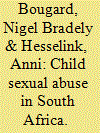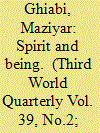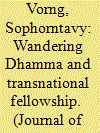|
|
|
Sort Order |
|
|
|
Items / Page
|
|
|
|
|
|
|
| Srl | Item |
| 1 |
ID:
186823


|
|
|
|
|
| Summary/Abstract |
Child sexual abuse and the criminogenesis thereof are notably not perpetrated in isolation from physical and emotional abuse – although empirical evidence suggests that the most profound impact thereof revolves around a desire to escape (as a coping mechanism) into a world of deviant sexual fantasy, rape and murder. The article explores a phenomenological case study analysis of a serial rapist and murderer from birth to early adulthood, prior to incarceration – and it depicts an existence driven by fatal sadistic sexual desires, hate and lethal intent. The researchers conducted face-to-face interviews with the participant comprising of three one-hour interviews, with the aid of a semi-structured interview schedule. The study highlighted the need for a proactive response in rendering psychosocial services to the abused child.
|
|
|
|
|
|
|
|
|
|
|
|
|
|
|
|
| 2 |
ID:
118627


|
|
|
| 3 |
ID:
157718


|
|
|
|
|
| Summary/Abstract |
Few commodities are as global as drugs. Cannabis, opium, heroin, amphetamines, lysergic acid diethylamide (LSD), khat, psychedelic cacti and mushrooms as well as an interminable list of other natural or synthesised substances travel and are consumed around the globe for all possible reasons. Human migration, trade, cultural trends, medical practice, political repression: together they constitute the drug phenomenon today – and indeed in much of human history. In this, drugs are spirit-like commodities, their value resting upon a fundamental ambiguity made up of individual, psychological, social, cultural, economic and medical circumstances. Defining a drug is an attempt at defining a spirit on the edge, which metamorphoses in time and space. At the same time, drugs remain a fundamentally political object. They are substances controlled by states, through mechanisms of policing, legitimated by judicial and medical evaluation, condemned often on moral grounds. Situated between a fluid social existence and a static legal dimension, drugs can become inspiring hermeneutic objects of study.
|
|
|
|
|
|
|
|
|
|
|
|
|
|
|
|
| 4 |
ID:
124087


|
|
|
|
|
| Publication |
2012.
|
| Summary/Abstract |
How many hours do you work each week? How much time do you need to work? These questions plague our society in the form of a well addressed diseases and addiction we call workaholism. Nowadays we are all required to accomplish more with less.
|
|
|
|
|
|
|
|
|
|
|
|
|
|
|
|
| 5 |
ID:
151659


|
|
|
|
|
| Summary/Abstract |
This article compares Buddhist and Christian approaches to the drug problem among ethnic minorities in northern Thailand. Government programmes implemented through Buddhist monasteries aim to construct Buddhist subjects and realise agendas of national security in border areas. Yet, they also offer development support and access to resources. Meanwhile, gospel rehabilitation centres provide much-needed drug treatment services while drawing highlanders into transnational spheres of Christian fellowship. Consequently, I argue that the relationship between ethnic minorities and the state can be defined in terms of aspiration and negotiation, as well as resistance and evasion, as has been previously argued in the literature.
|
|
|
|
|
|
|
|
|
|
|
|
|
|
|
|
|
|
|
|
|